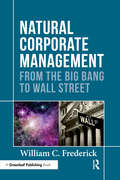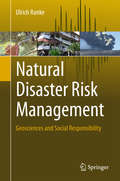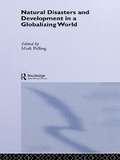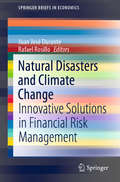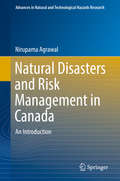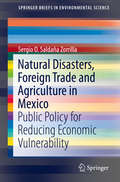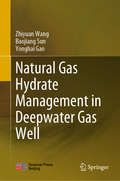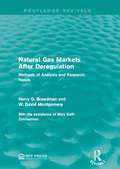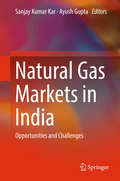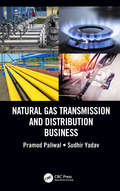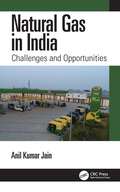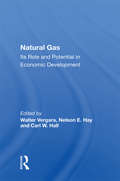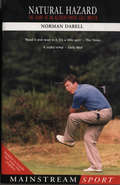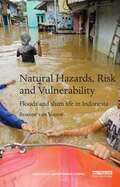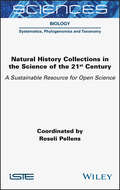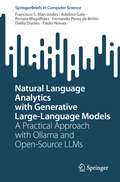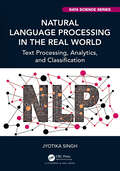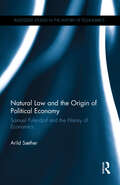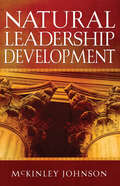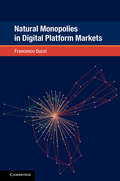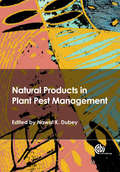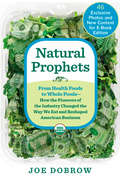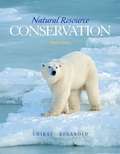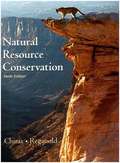- Table View
- List View
Natural Corporate Management: From the Big Bang to Wall Street
by William C. FrederickThis groundbreaking new book by business scholar William C. Frederick presents an innovative, exciting – even revolutionary – view of corporate management and the challenges it confronts in today's world. The author proposes a management paradigm shift transforming the way corporations do business. Management scholarship and research may well be rechanneled from current orientations to new models, concepts, and theories of what it takes to manage corporations in a planetary world confronting climate change, energy crises, and securing the well-being of all global citizens. Natural Corporate Management (NCM) is an awareness and an acceptance by the managers of today's business corporations of the close functional linkage between natural forces and human economic choices. NCM is not a set of techniques or methods but is a growing consciousness by managers of the presence and influence of nature in all managerial decisions. The book's central theme is that business and nature are locked into an evolutionary partnership that defines all aspects of corporate management, including decisions, policy, goal-seeking, organizational design, workplace behavior, and productive operations. This partnership of Nature and Nurture yields economic, social, and ecological dividends for corporations, their stakeholders, and the global community. An "Evolutionary Cascade" depicts the various phases of evolutionary change – physical, organic, genetic, human, neurological, symbolic – beginning with the Big Bang origin of the Universe and continuing to modern times. These evolutionary events collectively influence the operational activities of all business firms. A "Natural Theory of the Firm" summarizes the NCM approach, as well as the mind-set of corporate managers, and the bio-socio-economic consequences of their decisions. This theoretically-innovative book proposes an agenda of corporate actions to promote long-term sustainability and economic well-being of business, its stakeholders, and planetary citizens everywhere. It will be essential reading for managers and researchers at all levels who wish to engage seriously with the challenges of organic life and its long-term sustainability.
Natural Disaster Risk Management
by Ulrich RankeThis textbook provides a thorough introduction to natural disaster risk management. Many aspects of disaster risk management, such as those involved in earthquakes, volcanic eruptions, floods, avalanches and mudslides call for similar prevention and preparedness instruments, management concepts, and countermeasures. This textbook assumes the viewpoint of a regional disaster risk manager who is responsible for a certain area, and for making the lives of the people who live there safer, regardless of the type of natural disaster that may occur. The same holds true for boosting preparedness and awareness in the population at risk. The book includes numerous examples of hazard mitigation concepts and techniques, as well as ways of intensively involving the local population in prevention schemes at an early stage. Furthermore, it provides an in-depth examination of the function of risk communication, both as an instrument for disseminating official information and as a function of public media. In closing, a chapter on risk splitting offers insights into insurance-based models for risk financing. This comprehensive book is a must-read for all students, researchers and practitioners dealing with natural disaster risk management.
Natural Disaster and Development in a Globalizing World
by Mark PellingThe number of humanitarian disasters triggered by a natural hazard has doubled every decade since the 1960s. At the same time, the global economic growth rate per capita is twice its 1960s value. Does this mean economic growth is independent of the impacts of natural disaster? Natural Disaster and Development in a Globalizing World is the first book to acknowledge the full implications of globalization for disaster and development. The contributors to this book fully examine: global processes and how they might affect disaster risk at the global scale. links between international issues - such as diplomatic relations, the growth of non-governmental organizations and the health of the international insurance industry - and disaster risk the interaction of these large scale forces with local conditions through case study analysis of individual disaster events. In his revealing work, author Pelling makes clear the links between global scale processes and local experiences of disaster, and underlies the difficulty of attributing blame for individual disasters on specific global pressures. He argues that action to reduce disaster must be coordinated at the local, national and global scales and that there is a need for greater integration across the physical and social sciences. In this context, the human rights agenda is seen as a way of moving disaster reduction efforts forward.
Natural Disasters and Climate Change: Innovative Solutions in Financial Risk Management (SpringerBriefs in Economics)
by Juan José Durante Rafael RosilloThis book presents a technical approach to promoting the development of disaster and climate change risk financing and transfer strategies, and discusses several practical issues, chiefly focusing on Latin America and the Caribbean. Innovative risk financing and insurance mechanisms are vital for governments around the world, in order to provide financial protection and reduce the economic costs and social and developmental impacts of natural disasters and climate change. The book’s main content is complemented by a wealth of graphics, diagrams and tables that illustrate the concepts discussed and make the text accessible for practitioners and non-practitioners alike. The book offers proven, creative and innovative ideas on how to tackle risk financing and management for natural disasters and climate change. Strategic topics such as sovereign disaster risk financing, property catastrophe risk insurance, and agricultural insurance are also discussed.
Natural Disasters and Risk Management in Canada: An Introduction (Advances In Natural And Technological Hazards Research #49)
by Nirupama AgrawalThese chapters provide valuable and comprehensive information on a variety of hazards, including both scientific and social aspects of disasters. The work introduces the concept of large, medium and small scale hazards, and includes many useful case studies as well as working examples of theoretical concepts.As readers will acknowledge, today the distinction between natural and technological hazards is becoming blurred and a new concept of NATECH hazards is evolving. For permanent hazards (such as tides, wind waves, coastal erosion and climate change) routine predictions are made, whereas for evanescent hazards (including droughts, sea level rise, and coastal subsidence), monitoring of various parameters is the norm. Only for episodic hazards (for example hurricanes, winter storms, tsunamis, and river floods), early warning systems are used, with varying degrees of success.The book explores how, for certain episodic hazards like tornadoes, landslides, forest fires, snow avalanches, and volcanic eruptions, the early warning systems are still in various stages of development. Readers will gain knowledge of theoretical and practical concepts of risk evaluation which assist in better understanding of disaster dynamics, and readers will become better equipped in quantification of disaster risk and vulnerability. The author explains how risk reduction initiatives, taking into account stakeholders’ participation and perception, can provide a roadmap to building resilient communities and cities.This book will be useful not only to practitioners of disaster management but also to research scholars and graduate students. It is highly readable and will appeal more broadly too, to all those who are interested in the very latest thinking on, and expert analysis of, hazards and disasters.
Natural Disasters, Foreign Trade and Agriculture in Mexico
by Sergio O. Saldaña ZorrillaThis work responds to the increasing global need of measuring and analyzing impacts, vulnerabilities and coping capacity of countries, regions and communities regarding climate change, extreme weather conditions, natural disasters and institutional constraints. The case of Mexico, analyzed in this work, provides lessons for further developing countries to assess natural disasters vulnerability, for making informed adaptation decisions and to optimize resources for reducing country and community vulnerability. This book's analyses contribute to the current debate of the long-term economic impact of natural disasters (hurricanes, earthquakes, etc. ), as well as offer an integral methodology combining natural and social sciences for studies of country and community level vulnerability to climate change. The lessons derived from this analysis provide useful elements for the design and improvement of governmental policies concerning social and economic development as well. In addition, the desegregation of this analysis has the advantage of facilitating the design and evaluation of governmental projects at municipal, sub-national and national level, as well as provides conceptual-empirical elements for international cooperation in matters of disaster risk reduction, climate change adaptation, rural development and poverty reduction.
Natural Gas Hydrate Management in Deepwater Gas Well
by Baojiang Sun Zhiyuan Wang Yonghai GaoThis book chiefly describes the theories and technologies for natural gas hydrate management in deepwater gas wells. It systematically explores the mechanisms of hydrate formation, migration, deposition and blockage in multiphase flow in gas-dominated systems; constructs a multiphase flow model of multi-component systems for wells that takes into account hydrate phase transition; reveals the influence of hydrate phase transition on multiphase flows, and puts forward a creative hydrate blockage management method based on hydrate blockage free window (HBFW), which enormously improves the hydrate prevention effect in deepwater wells. The book combines essential theories and industrial technology practice to facilitate a deeper understanding of approaches to and technologies for hydrate management in deepwater wells, and provides guidance on operation design. Accordingly, it represents a valuable reference guide for both researchers and graduate students working in oil and gas engineering, offshore oil and gas engineering, oil and gas storage and transportation engineering, as well as technical staff in the fields of deepwater oil and gas drilling, development, and flow assurance.
Natural Gas Markets After Deregulation: Methods of Analysis and Research Needs (Routledge Revivals)
by Harry G. Broadman W. David MontgomeryOriginally published in 1983, Broadman and Montgomery present an agenda for further research into deregulated natural gas markets by relating natural gas production, transmission and distribution with the economic function of contracts and local distribution companies. This work raises fundamental issues that could arise with the deregulation of the natural gas industry and outlines analytical methods that could be used to predict any problems that might arise and possible changes to policy. This title is of interest to students of Environmental Studies and professionals.
Natural Gas Markets in India
by Sanjay Kumar Kar Ayush GuptaThis book shares the latest market developments and advances in natural gas demand, supply, transmission, distribution, and consumption, with a special emphasis on the Indian context. Chapters are written by researchers and industry professionals working in the field of natural gas and energy to provide deeper insights into natural gas market structure, market development, business opportunities and market growth. Topics covered include, natural gas demand-supply, exploration and production policy, downstream regulatory developments, city gas distribution, pipeline, pricing, and taxation policies impacting natural gas market developments in India. The book will be useful to researchers, professionals, and policy makers working in the area of natural gas and related fields.
Natural Gas Transmission and Distribution Business
by Pramod Paliwal Sudhir YadavThe natural gas business consists of two major aspects, sourcing and transportation, and distribution has been a growing area of interest to industry, government and academia. With the emphasis on promoting natural gas sector, there is an increasing need to have a well documented book that deals with the business issues, particularly the transportation and distribution of this sector, specifically aimed at petroleum engineers and professionals. This book fills this gap to provide structured material that deals with managerial and regulatory aspects with an applied technical perspective wherever needed.
Natural Gas and Israel's Energy Future
by Thomas Light Claude Berrebi James Griffin Steven W. Popper Endy Y. MinThis book discusses the opportunities and risks the government of Israel faces in shifting to a greater reliance on domestic and imported natural gas. By applying newly developed methods for strategic planning and decisionmaking under deep uncertainty, the analysis seeks to help the Israeli government engage in managed change by choosing robust strategies that minimize potential consequences of relying more heavily on natural gas.
Natural Gas in India: Challenges and Opportunities
by Anil Kumar JainThis book provides a detailed discussion on India’s energy mix including descriptive use of the Shannon Wiener diversity index for numerically comparing India’s diversity in energy supply with other leading energy-consuming countries. The likely supply scenarios of both domestic and imported gas, and price competitiveness with competing fuels in differing consuming sectors, have also been presented. Overall, it covers energy systems, a comparison of the Indian natural gas economy with other countries and a scenario-based analysis of gas demand in India in 2030. Features: Presents a well-structured and robust thesis on the challenges and opportunities for natural gas in India’s energy future. Draws upon key insights, lessons and ways forward from the gas sector reform process. Addresses the energy transition scenario towards net zero. Includes comparative analysis of India’s diversity of commercial primary energy supply. Uses granular data and visual representations of the same to convey the key arguments. This book is aimed at oil and gas industry stakeholders including professionals, business executives, techno-managerial personnel and students in chemical engineering.
Natural Gas: Its Role And Potential In Economic Development
by Walter Vergara Nelson E. Hay Carl W. HallThis book is concerned with the multifaceted character of natural gas and the potential for its utilization as a powerful tool for future development. It deals with the specifics of gas uses in a number of sectors chosen for their relevance in the development of industrial economies.
Natural Hazard: The Diary of an Accident-Prone Golf Watcher
by Norman DabellNorman Dabell, journalist, broadcaster and notorious jinx, has been covering the European golf circuit for over 20 years, though after reading this hilarious account of his mishaps, you may well come to wonder how he has managed to survive for so long.Join Norman as he retraces his pursuit of the travelling circus of the golf world from St Andrews to Sun City, Malaga to Morocco, encountering all the great faces of the modern game. Woods, Ballesteros, Faldo, Montgomerie, Westwood, Lyle, Woosnam, Langer, Olazabal, Garcia... they have all made the headlines. Dabell is there to make sure they do - while also trying to survive another day. Golf isn't really meant to be fun, they say, and sometimes it can be toture. But Danbell's rib-tickling (and his have been more than tickled) account will have even the most serious enthusiast in stitches. Fate has caused him many a tumble, broken bone and on-air gaffe, and Dabell's presence inside the ropes has been known to make even the toughest tour professional blanche. However, he is a favourite of Major-winner Vijay Singh, who might have never have got his career on the road if his ball had plummeted out of bounds instead of ricocheting onto the fairway off Dabell's head in Spain in 1990. Singh made a birdie instead of a possible double-bogey, won the tournament and ten years later went on to beat the world at Augusta. Just one of a thousand escapades which happened to a living, breathing Natural Hazard.
Natural Hazards, Risk and Vulnerability: Floods and slum life in Indonesia (Routledge Humanitarian Studies)
by Roanne van VoorstDifferent people handle risk in different ways. The current lack of understanding about this heterogeneity in risk behaviour makes it difficult to intervene effectively in risk-prone communities. Natural Hazards, Risk and Vulnerability offers a unique insight in the everyday life of a group of riverbank settlers in Jakarta - one of the most vulnerable areas worldwide in terms of exposure to natural hazards. Based on long-term fieldwork, the book portrays the often creative and innovative ways in which slum dwellers cope with recurrent floods. The book shows that behaviour that is often described as irrational or ineffective by outside experts can be highly pragmatic and often effective. This book argues that human risk behaviour cannot be explained by the risk itself, but instead by seemingly unrelated factors such as trust in authorities and aid-institutions and unequal power structures. By considering a risk as a lens that exposes these factors, a completely new type of analysis is proposed that offers useful insights for everyone concerned about how people cope with the currently increasing amount of natural hazard. This is a valuable resource for academics, researchers and policy makers in the areas of risk studies, disaster and natural hazard, urban studies, anthropology, development, Southeast Asian studies and Indonesia studies.
Natural History Collections in the Science of the 21st Century: A Sustainable Resource for Open Science
by Roseli PellensNatural history collections have recently acquired an unprecedented place of importance in scientific research. Originally created in the context of systematics and taxonomy, they are now proving to be fundamental for answering various scientific and societal questions that are as significant as they are current.Natural History Collections in the Science of the 21st Century presents a wide range of questions and answers raised by the study of collections. The billions of specimens that have been collected from all around the world over more than two centuries provide us with information that is vital in our quest for knowledge about the Earth, the universe, the diversity of life and the history of humankind.These collections also provide valuable reference points from the past to help us understand the nature and dynamics of global change today. Their physical permanence is the best guarantee we have of a return to data and to information sources in the context of open science.
Natural Language Analytics with Generative Large-Language Models: A Practical Approach with Ollama and Open-Source LLMs (SpringerBriefs in Computer Science)
by Paulo Novais Dalila Durães Francisco S. Marcondes Adelino Gala Renata Magalhães Fernando Perez de BrittoThis book explores the application of generative Large Language Models (LLMs) for extracting and analyzing data from natural language artefacts. Unlike traditional uses of LLMs, such as translation and summarization, this book focuses on utilizing these models to convert unstructured text into data that can be processed through the data science pipeline to generate actionable insights. The content is designed for professionals in diverse fields including cognitive science, linguistics, management, and information systems. It combines insights from both industry and academia to provide a comprehensive understanding of how LLMs can be effectively used for natural language analytics (NLA). The book details practical methodologies for implementing LLMs locally using open-source tools, ensuring data privacy and feasibility without the need for expensive infrastructure. Key topics include interpretant, mindset and cultural analysis, emphasizing the use of LLMs to derive soft data—qualitative information crucial for nuanced decision-making. The text also outlines the technical aspects of LLMs, including their architecture, token embeddings, and the differences between encoder-based and decoder-based models. By providing a case study and practical examples, the authors show how LLMs can be used to meet various analytical needs, making this book a valuable resource for anyone looking to integrate advanced natural language processing techniques into their data analysis workflows.
Natural Language Processing in the Real World: Text Processing, Analytics, and Classification (Chapman & Hall/CRC Data Science Series)
by Jyotika SinghNatural Language Processing in the Real World is a practical guide for applying data science and machine learning to build Natural Language Processing (NLP) solutions. Where traditional, academic-taught NLP is often accompanied by a data source or dataset to aid solution building, this book is situated in the real world where there may not be an existing rich dataset. This book covers the basic concepts behind NLP and text processing and discusses the applications across 15 industry verticals. From data sources and extraction to transformation and modelling, and classic Machine Learning to Deep Learning and Transformers, several popular applications of NLP are discussed and implemented. This book provides a hands-on and holistic guide for anyone looking to build NLP solutions, from students of Computer Science to those involved in large-scale industrial projects.
Natural Law and the Origin of Political Economy: Samuel Pufendorf and the History of Economics (Routledge Studies in the History of Economics)
by Arild SaetherSamuel Pufendorf’s work on natural law and political economy was extensive and has been cited by several important figures in the history of economic thought. Yet his name is rarely mentioned in textbooks on the history of economic thought, the history of political science or the history of philosophy. In this unprecedented study, Arild Sæther sheds new light both on Pufendorf’s own life and work, as well as his influence on his contemporaries and on later scholars. This book explores Pufendorf ’s doctrines of political economy and his work on natural law, which was translated into several major European languages. Natural Law and the Origin of Political Economy considers the influence he had on the writings on political economy of John Locke, Charles Montesquieu, Jean-Jacques Rousseau, Francis Hutcheson and Adam Smith, amongst others. If Smith can be called the father of modern economics, this book claims that Pufendorf can be called the grandfather. This volume is of great importance to those who study Pufendorf ’s extensive works, as well as those interested in history of economic thought, political economy and political philosophy.
Natural Leadership Development
by Mckinley JohnsonAuthor McKinley Johnson gives invaluable direction for reshaping leadership skills and redefining organizations and companies. He defines natural leadership development as &“the process of understanding the environmental influences that shape the nature, character, and authority of leaders.&” Johnson shows how God designed this concept, and if the seed of leadership grows in the right environment, with a leader&’s proper focus on his God-given identity and mission, has a healing impact on society.About the AuthorMcKinley Johnson, the youngest of seven children, is grateful for the discipline and hard work his parents taught him. The fruit of their training includes his service in various leadership roles in the accounting profession for more than eighteen years, and his ministry in church leadership for ten years. He has pursued gradute studies in leadership for several years and has earned a Doctorate in Strategic Leadership (DSL) from Regent University.
Natural Monopolies in Digital Platform Markets (Global Competition Law and Economics Policy)
by Francesco DucciCompetition policy debates on digital platform markets are often premised on the idea that market fragmentation and the standard forces of competition and entry may provide a potential solution to excessive concentration and market power. In this work, Francesco Ducci provides readers with a different perspective based on the theoretical lens of natural monopoly. Ducci explores this framework through the development of three case studies on horizontal search, e-commerce marketplaces, and ride-hailing platforms, investigating the strength and limit of potential (and often heterogeneous) sources of natural monopoly at play in each industry. Building on these case studies, the book then derives from the application of the natural monopoly framework general policy implications for digital industries by identifying the respective institutional flaws and shortcomings of ex ante and ex post approaches to market power as one of the central challenges in digital platform markets.
Natural Products in Plant Pest Management
by Nawal K. DubeyThis book brings together the chemistry and biology of natural pesticides and discusses modern trends in their development and use in pest management.
Natural Prophets: From Health Foods to Whole Foods--How the Pioneers of the Industry Changed the W ay We Eat and Reshaped American Business
by Joe DobrowThe e-book edition includes 46 exclusive photos and expanded content!From a handful of idealistic farmers and local co-ops in the 1960s to the domination of juggernauts like Whole Foods, the wild success of the natural and organic foods industry proves that principled business is not just possible, but profitable. With nearly unfettered double-digit annual growth, the development of this now-$88 billion industry is one of the most remarkable untold stories in American business history. Trailblazers like Mo Siegel of Celestial Seasonings, Gary Hirshberg of Stonyfield Farms, and John Mackey of Whole Foods openly challenged the interests of Big American Agribusiness, transformed food manufacturing and retailing, and re-wrote the playbook for small entrepreneurs.Dobrow, a 20-year veteran of the natural foods industry who had a front row seat (and backstage pass) to much of the upheaval and expansion he describes, characterizes the radical vision of these "natural prophets" as one part anti-industrial activism, one part bold opportunism, and one part new-era marketing genius. The triple bottom line—people, planet, profit—emerged as a major new lodestone for successful, values-based business practices.Natural Prophets is a fascinating narrative account of these upstart Davids—their failures and their unprecedented successes—that distills lessons about management, marketing, and entrepreneurial growth, and offers a lively, urgent profile of an industry that continues to change the way we eat, the way we live, and the way we think about ourselves.
Natural Resource Conservation: Management For A Sustainable Future
by Daniel Chiras John ReganoldThis comprehensive book describes the ecological principles, policies, and practices required to create a sustainable future. It emphasizes practical, cost-effective, sustainable solutions to these problems that make sense from social, economic, and environmental perspectives. A focus on sustainable development puts readers in touch with one of the most significant shifts in thinking and action in the environmental and resource management arenas. A variety of lasting solutions are provided that make sense from social, economic, and environmental viewpoints.
Natural Resource Conservation: Management For A Sustainable Future
by Daniel D. Chiras John P. ReganoldThis comprehensive text provides the ecological principles, policies, and practices to manage a sustainable future. It emphasizes practical, cost-effective, sustainable solutions to these problems that make sense from social, economic, and environmental perspectives.
